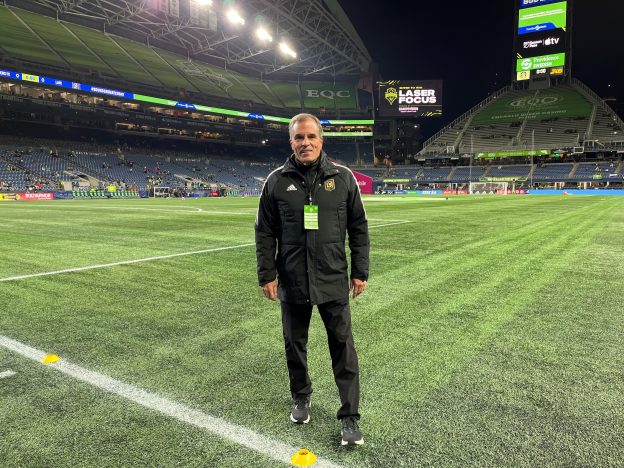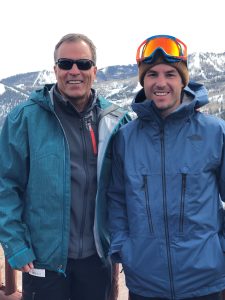
Five questions for … Dr. Robert Sallis
Robert Sallis MD, FAAFP, FACSM, is a family medicine and sports medicine physician practicing at the Kaiser Permanente Fontana Medical Center, where he serves as director of the sports medicine fellowship program. He is a clinical professor of Family Medicine at both the Kaiser Permanente Bernard J. Tyson School of Medicine and the University of California, Riverside School of Medicine. He collaborates with scientists at the Department of Research & Evaluation on research. Recently, he was senior author on a research article that showed being active can lower your risk of getting seriously ill with COVID, regardless of your race or the chronic conditions you may have. Editors chose the study as the American Journal of Preventive Medicine 2023 Article of the Year*.
What inspired you to go into medicine?
I played college basketball at the Air Force Academy and when I failed my first chemistry exam, my coach got me a tutor who turned out to be head of the pre-med program. After doing well in my chemistry class, my tutor became my mentor and convinced me to enroll in the pre-med program at the Academy and apply to medical school. My vision was too bad to go to pilot training, so I was happy to pursue medicine as a career.
When did you begin doing research?
I began doing research while I was a resident in Family Medicine at the Fontana Medical Center. I loved being able to take a clinical question I encountered in my practice and use research to answer it. One of my first studies looked at the incidence of brachial plexus injuries in football players. It was one of the first studies to show how common this injury occurred. It gave me a thrill to see colleagues reference my work in subsequent papers and lectures.
What study are you most proud of and why?
There are a couple of studies that come to mind. The first looked at the incidence of headaches in college football players. We showed that headaches occurred very commonly after hitting in football and oftentimes players failed to report them. I think this paper was one of many that helped pave the way to stricter evaluation and management of sports-related concussion. I am also quite proud of our recent studies on the effect of exercise on severe COVID outcomes. These studies were done in collaboration with my great colleagues in the Department of Research & Evaluation. We showed quite clearly that patients who were more active had a much lower risk of severe COVID outcomes. Our studies helped convince the CDC to list physical inactivity as a risk factor for severe COVID.
How does your clinical work inform your research, and vice versa?
My research has gone hand in hand with my clinical work. In addition to my family medicine training, I have a Certificate of Added Qualifications in Sports Medicine. I helped start and now direct the Sports Medicine Fellowship Program at Kaiser Permanente in Fontana. So many of my studies have centered on clinical questions I encounter on the sidelines. In addition, I have a passion for connecting fitness with health care. When I served as president of the American College of Sports Medicine back in 2007, I started an initiative called Exercise is Medicine. At the heart of this initiative is convincing clinicians to assess and prescribe exercise at every visit. Kaiser Permanente was the first major health care organization to implement a physical activity vital sign, or as we call it, an exercise vital sign. This helps our physicians assess and prescribe exercise to every patient. It has also been a great research tool to help study the effect of exercise on various health outcomes.
What research are you conducting now that you are most excited about?
Right now, I am enjoying mentoring our Kaiser Permanente medical students with their research projects. I am also involved with some projects using exercise as a treatment for various chronic diseases. I believe exercise is the most powerful medicine we have to prevent and treat the chronic diseases that are plaguing our country and the world. I am excited about the potential to increase the use of this drug called exercise in clinical medicine.
Bonus question: What do you like to do in your spare time while not at work?
I love to be active every day. For exercise I typically jog and do my rower along with some stretching and light resistance exercise. I also love to hike, ski, golf, and play pickleball. I have a 1-year-old grandson who I love spending time with.
*Read more about the Article of the Year award here.
Background on Dr. Sallis: He received his Bachelor of Science degree from the U.S. Air Force Academy (where he played intercollegiate basketball) and his medical degree from Texas A&M University. He completed his residency training in Family Medicine at Kaiser Permanente Fontana Medical Center, where he served as chief resident.
Dr. Sallis is a past president of the American College of Sports Medicine and currently chairs the Advisory Board for Exercise is Medicine® Global Health Initiative that he started as a joint initiative of ACSM and the American Medical Association. He also chaired the Healthcare Sector for the U.S. National Physical Activity Plan.
Dr. Sallis has served for many years as the head team physician at Pomona College in Claremont, California. He is also the chief medical officer for the Los Angeles Football Club (Major League Soccer) and chairs the Ironman Sports Medicine Conference in Kona, Hawaii.
Images: Top: Dr. Sallis serves as the chief medical officer for the Los Angeles Football Club; bottom: Skiing with his son, Matt Sallis, in Park City, Utah





